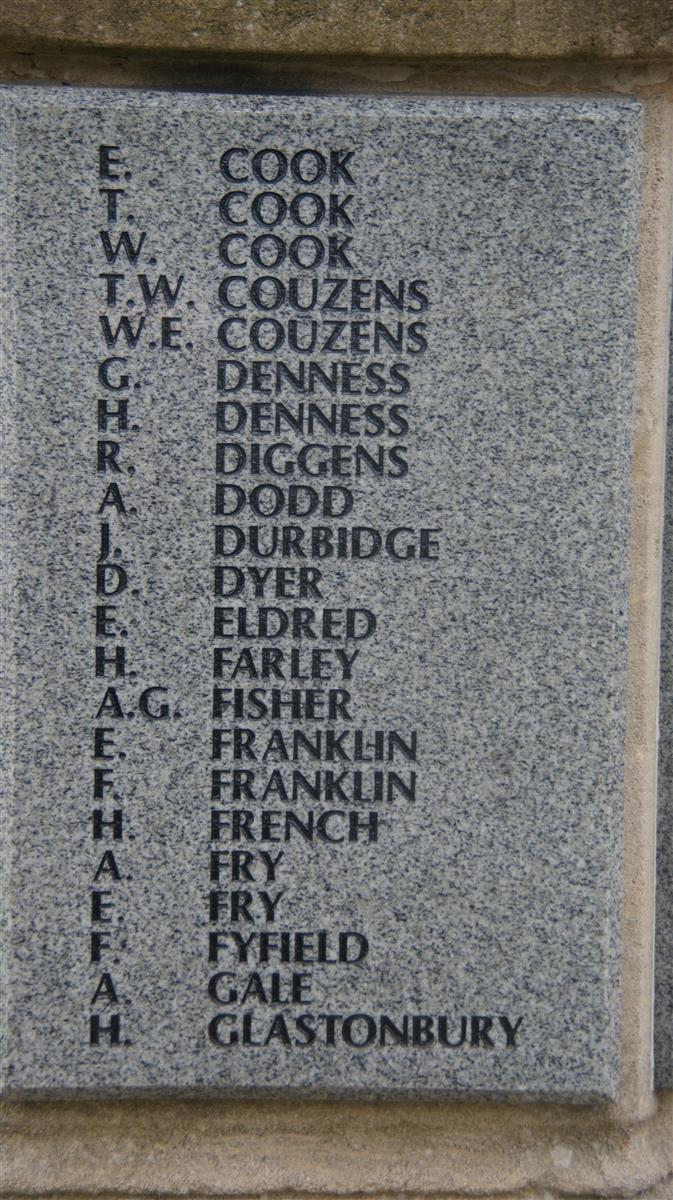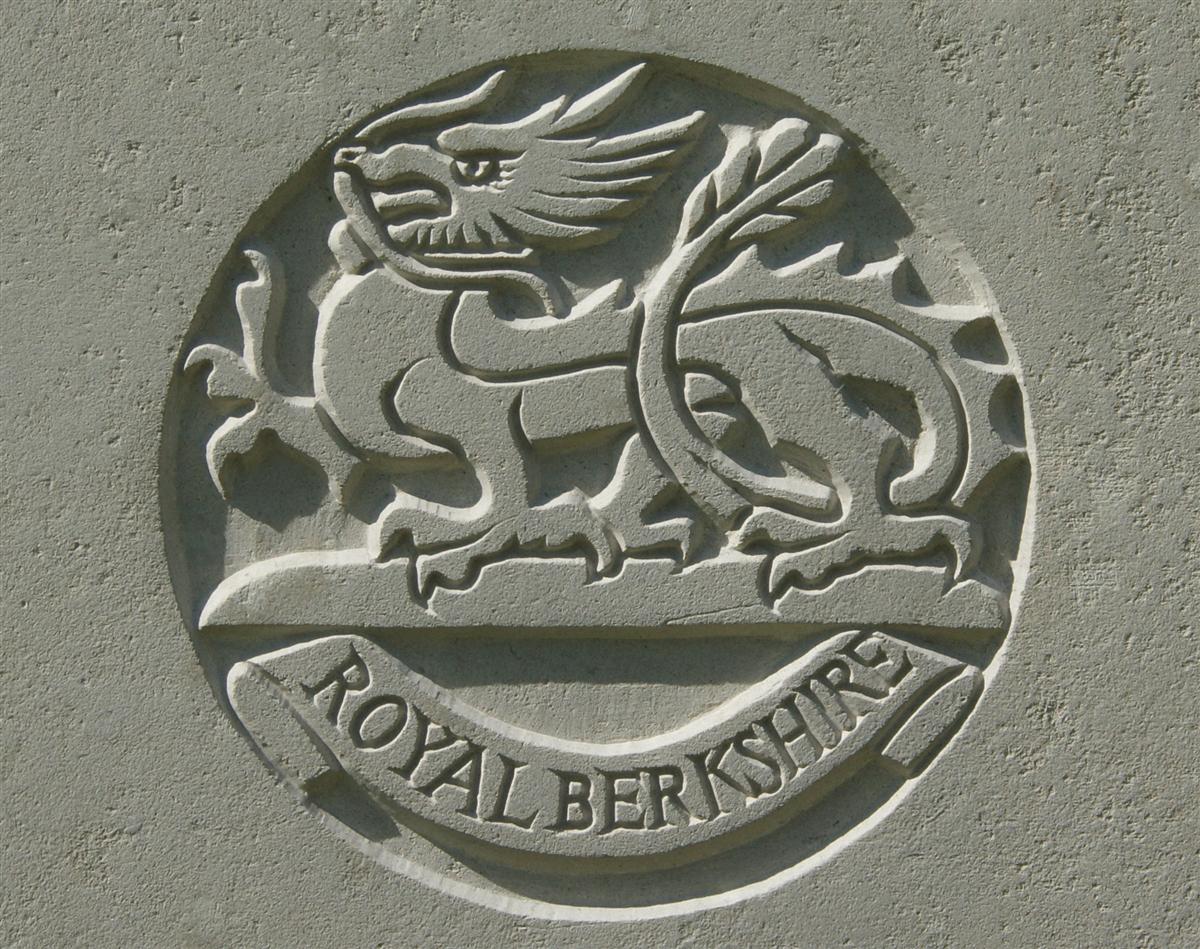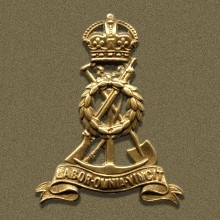Ernest James Fry
Private 94964 Ernest James Fry, 159 Company, Labour Corps.

Ernest's name on Thatcham War Memorial - below his brother Alfred. |
Ernest was born in Crookham, Berkshire in 1885 the son of James Charles Fry and his wife Ellen Rose née Dowling. James was a baker serving the scattered community to the south of Crookham and Greenham Commons. Crookham is a hamlet of the much larger village of Thatcham (now a town of 30,000+ inhabitants), but the Fry’s lived in an area far from the main settlement and some distance from the cluster of housing normally thought of as Crookham. In reality he probably got more trade from the village of Newtown close by but over the border in Hampshire.
Ernest was one of only four children, a relatively small family by the standards of the time. His siblings, all brothers, were Albert John (born 1886), Jesse Charles (1889), and Alfred Arthur (1892).
The bakery evidently did a decent trade because both Ernest and Albert joined their father in the business rather than seek employment elsewhere. By 1911 Arthur had left home to work, as a baker, for Henry Pearce in Headley – where he may well have been serving an apprenticeship as he too had joined the family business by 1916. The remaining brother, Jesse, was the only one to rebel against embroilment in the family trade; he became a ‘cycle agent’, which covers a wide range of activities, but Jesse was perhaps more likely to be the local cycle repair man than a business entrepreneur selling a wide range of the latest bicycles.
After war was declared in August 1914 many young men eagerly volunteered, but not Ernest. By this time his father was 64 and, as the eldest son, Ernest would have taken on much of the running of the family business; he had a lot more to lose than an employee would. However, the Government introduced conscription in January 1916 and Ernest was duly called up for service.
Ernrst, John and Alfred were all called up – and foolishly ignored their papers, believing they were automatically exempt because they were working in a reserved occupation. When a second set of papers arrived they should have realised things were not that simple – but they ignored them again. The next call was from the police, who came to arrest them for not appearing to be enlisted.
They appeared before a magistrate in Newbury:
Reading Mercury, 22 April 1916 – County Police Court
Wednesday, April 19th – Before R Beynon Esq.
Three Baker Brothers and Military Service
Arthur Alfred Fry, John Albert Fry, and Ernest James Fry, brothers, single men, living at Crookham, and engaged with their father in a baking business, were charged with failing to appear at the time and place required on the 10th and 11th April.
P S Gallop, stationed at Thatcham, stated that he asked the men the reason they had not attended. Arthur Fry replied, “Because I had other work to do”; John Albert said, “Conscientious objection through pressure of business”; and Ernest answered, “Conscientious objection through business.”
In reply to Mr Lucas, who appeared for the brothers witness said that they told him they wer bakers, and although they did not say this was a reserved occupation he understood that this was what they meant.
Mr Lucas applied for an adjournment for a fortnight. These men were engaged with their father (who was quite unable to do anything himself) in a bakery business at Crookham, doing twelve sacks per week, and serving a wide area, and no one else was working in the business, which would have to go if they were taken away. The reason for asking for an adjournment was that their cases might come before the tribunal in the usual way. If the tribunal decided that they must go they must submit, but it might be possible in the interval for the father to make some arrangement for carrying on the business.
The Magistrate: The case is adjourned for a fortnight.
Lieutenant Bidmead (from the Newbury Recruiting Office): Am I too late to object to this on behalf of the military authorities?
The Magistrate: The decision has been given.
On the application of Mr Lucas the men were admitted to bail in their own recognizance of £5 each.
The brothers’ case appeared before the Newbury Rural Tribunal on 2 May 1916. Their father applied for their exemption from conscription on the grounds that they were working in a reserved occupation. However, the military authorities objected on the grounds that they were too late to appeal. As they had each received two separate notices of their call up and simply ignored them (until the police came to arrest them for non-appearance) one can see the military’s point.
Sadly for the Frys the tribunal ruled in favour of the military objection – they had failed to appeal within the time allotted and hence the appeal would not be heard. So, despite the possibility of there being grounds for their exemption from service they would have to go into the army. The following day all three became soldiers.
As their council said on hearing the tribunal’s ruling “Tomorrow there will be a considerable district without bread”. For a newspaper report of the Tribunal hearing see here.
There is no reason to believe that all three would have been granted exemption had they appealed at the appropriate time – it is hard to believe that a tribunal would consider that a small rural bakery had genuine need for three bakers. Perhaps one, probably Ernest as the eldest, would have been reprieved. Certainly the desperate state of the bakery business seems to have been exaggerated; their father was still running it a decade later.

The regimental badge of the Berkshire Regiment, as used on CWGC headstones. |
On the 14th June section III of the Portsmouth Defences was ordered to France along with the rest of the 10th Battalion. They left Portsmouth on 17th June for Southampton and half embarked on the Transport ship Astralind on the 18th with the rest on the Caesarea on the 19th. On arrival at Le Havre they went to Sauvie camp and on the 20th entrained for Rouen to be based at 3 Labour Camp at Quevilly. Here they worked at the Docks and Ordnance depot.
The Labour Corps was formed December 1916 and absorbed the 10th Battalion which was formally transferred to the Labour Corps 9th May 1917 as 158 and 159 Labour Companies. Ernest joined 159 Company with the service number 94964.

The regimental badge of the Labour Corps. (wikipedia) |
He was home for Christmas 1917, on leave or through sickness, and took the opportunity to marry his sweetheart, Ellen Gostling, on Christmas Day.
In March 1918, back in France, he had a bout of dysentery that required medical attention. Subsequently he suffered two further bouts of diarrhoea eventually being invalided home and admitted for treatment at Newcastle under Lyme War Hospital, Staffordshire on 19 December 1918.
He was discharged from hospital on 13 January, fit for duty but no longer required by the Army. He was, therefore, recommended for ‘transfer to Class Z’. This was the normal form of discharge for a fit soldier – he would remain a member of the reserve in case the peace process failed and hostilities resumed. Meanwhile Ernest was able to go home and resume his civilian life while the discharge paperwork was processed through the system.
However, all was not well, Ernest died at home on 1 February 1919, three weeks after his discharge from hospital.
Newbury Weekly News, 13 February 1919 – Deaths
FRY – February 1st, at Crookham, Pte E Fry, Labour Corps, dearly beloved husband of Ellen Fry, Crookham, eldest son of Mr and Mrs J C Fry.
Oh, how much we miss thee, loved one,
No tongue on earth can tell.
But God thought best to take him home,
With Him in Heaven to dwell.
His military record includes a form covering any possible award from any disability caused by his service. Owing to inherent delays in the paperwork (the Army was processing hundreds of thousands of discharges as fast as it could cope with them) this form was finally completed on 13 February and clearly notes that there would be no award since Ernest had no disability – obviously the authorities were still wholly unaware that he had died 12 days earlier.
Ernest was buried on 6 February 1919 in grave VI.799 at Thatcham Cemetery. His death certificate gives the cause of death as an epileptic convultion and asphyxia. This does not appear to be linked to dysentry or diarrhoea, nevertheless he was still a serving soldier (just) and his name joined his brother Alfred's on Thatcham's war memorials. He is remembered on the Thatcham War Memorial and on the memorial board in St Mary’s Church, Thatcham.
His name is also among those on the memorial in Newbury Baptist Church, which records the deaths of Baptists from the wider religious community served by the Newbury church and its satellite chapels. As his brother Alfred’s name is not on this memorial it seems that the Frys were not a Baptist family; it was probably Ernest’s wife, Ellen, who was the Baptist, though Ernest may well have chosen this path of worship himself.
Ernest’s death while still a serving soldier means that he should be remembered on the national Debt of Honour Roll maintained by the Commonwealth War Graves Commission, which should also be monitoring and caring for his grave. However, his was one of many cases that slipped through the net. An application will be made to the Commission to rectify this and to add his name to the honour roll and his grave to those under the Commission’s care.
Should the Commission agree that he qualifies they will add a headstone to his unmarked grave.
Family
Ernest’s mother also died in 1919, but his father continued to run the Crookham Bakery until his death in 1930.
All four Fry brothers served during the war – following his abrupt conscription Alfred served with the 1/7th (Territorial) Battalion, Worcestershire Regiment. He was wounded in November 1917 and died later that month – his story is told here.
Albert was the third brother conscripted, but no record of his service has been found. This it not unusual, the majority of service records were destroyed in a fire during WW2. The alternative sources of information tend to require more information in order to work out which Albert John Fry they might apply to. Numerous Albert J Frys were awarded medals (the most complete record source for WW1 army service), but the records do not contain any useful identification information (such as date of birth, next of kin, address). So John’s service remains a mystery – he could even have failed the medical on attestation and returned to the bakery within a few days of the Tribunal in May 1916. He certainly did return at some point - he died in Crookham in 1942.
The fourth brother, Jesse, served voluntarily, enlisting on 15 November 1915 into the King’s Royal Rifle Corps (R16693). After training he was posted to the regiment’s 12th Battalion in Belgium.
Newbury Weekly News, 3 August 1916 – Local War Notes
Private Jesse Fry, third son of Mr and Mrs Fry, of Crookham, has been seriously wounded during the great advance in France by shrapnel. He is being treated in hospital at Woolwich, and by the latest report is progressing favourably. Two other brothers, Ernest and Alfred, are also seeing service in France.
It should be noted that this news item is not entirely correct – Jesse’s battalion was in the Ypres area a good distance away from the ‘great advance’ on the Somme and Alfred was still training in the UK at this time. It is impossible to be sure when or where Jesse received his wounds, newspaper reports such as this were usually printed weeks after the event, sometimes months. The most likely occasions were in early June, when the battalion was very active in the Battle of Mount Sorrel (a German attack on Canadian-held positions east of Ypres) and in early July when the battalion suffered a number of casualties from enemy shelling while manning the line at Potijze.
Further reports followed:
Newbury Weekly News, 3 August 1916 – Local War Notes
Rifleman Jesse Fry, of Crookham, writes to say that he is in Brook Hospital, Woolwich, satisfactorily recovering from his wound.
Newbury Weekly News, 3 August 1916 – Local War Notes
Rifleman J Fry, of Crookham Common, who was badly wounded in June of last year, is still in hospital in Croydon. He has been in four different hospitals since September, but is progressing fairly well.
While Jesse recovered he was not longer fit for army service and was discharged on 4 September 1917. He returned home and picked up his old life, returning to his role as the local cycle mechanic. In 1918 he married Hilda Parker and the couple settled at Head’s Hill, where Jesse died on 7 January 1943.
